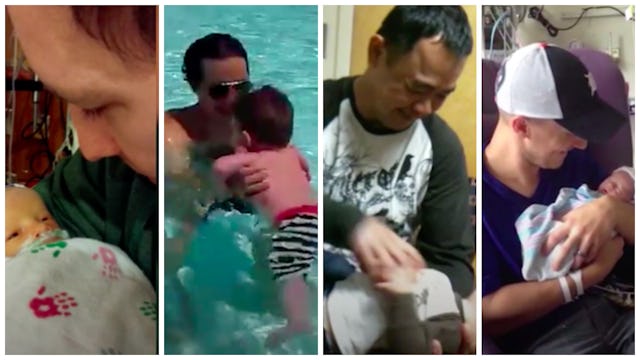Grieving Father Makes It His Mission To Help Other Dads Cope With Loss

After losing his children, a father is helping others process their grief
When a couple loses a child, the grief is consuming for both parents, but it’s more difficult for fathers to express their pain openly. A mother sobbing over the death of her child is accepted, but because of societal expectations, men often bury their sadness and pain in an effort to be “strong.”
One father is on a mission to let fellow dads know that it’s not just OK to grieve, it’s necessary.
RELATED: The Best Grief Podcasts To Help You Through This Difficult Time
Kelly Farley and his wife endured two heartbreaking pregnancy losses: a son, Noah, and a daughter, Katie. In trying to be strong for his wife, Farley wasn’t allowing himself to process his own pain — until that pain gave him no choice but to acknowledge it.
“I found myself not being able to get out of bed,” Farley tells TODAY. “I kind of went into a tailspin. I was not able to run from it anymore.”
In the video, Farley reads a letter to fellow grieving dads while we see footage of fathers holding children they’ve lost. “Society told us from the time we were young: Toughen up. Take it like a man. Big boys don’t cry. Let me tell you, men DO cry. It’s essential, we have to release the pain. We must take time to mourn. And asking for help is NOT a sign of weakness. It’s a sign of courage,” he says.
He understands all too well how the world views mothers and fathers differently when it comes to grief. “I thought I needed to be a pillar of strength, to help my wife. ‘Don’t cry, that’s a sign of weakness.’ You’re taught that as a kid and you believe it,” he shares. “The loss of a child is the most profound thing. People will say, ‘How’s your wife doing?’ No one asks your wife how you are doing.”
Image via Kelly Farley
Farley decided to do something about these damaging misconceptions that keep fathers from properly expressing their emotions and getting much-needed help by starting the website Grieving Dads. He included a special page where fathers can tell their own stories of losing a chid, anonymously if they choose, and along with fellow grieving parents, Farley himself answers the men’s posts with advice, comfort and companionship.
He realized the importance of having someone grasp how deeply the loss of a child hurts not just a mother, but a father, when someone finally recognized his own pain. Farley spoke to a lay leader at his church about the loss of his children and the response he got was life-changing. “That’s a heavy load, brother,” the leader told him.
That one remark was all it took to set Farley on a path of healing. “I know that sounds so simple, but for me it was confirmation that it was OK for a guy to tell another guy about the pain he was feeling,” he explains. After that encounter, Farley joined support groups and started to open up to others about his pain. This is how he started to feel better.
“I made a commitment to myself that I was going to do something to help other guys,” he says. Farley has his personal phone number published on his website and says he receives calls, sometimes in the middle of the night, from dads who need an ear to listen. He recounts that sometimes, they just cry. And that’s OK.
“I don’t say things like, ‘Things will get better. I say, ‘Things CAN get better.’”
Farley says the pain is the same for both moms and dads in the wake of losing a child, but men are expected to handle it much differently. “We’re taught to be the protectors of the family. So you feel, ‘I let them down.’ There’s this shame and guilt,” he shares.
The dad acknowledges that days like Father’s Day can be incredibly difficult for those who have lost a child, saying that happy social media posts from friends can be painful to see.
Though it won’t ever be easy, both time and the work he’s doing with other dads is helping Farley work through his own grief. The first several Father’s Days without his children were full of pain, but now, there’s joy and hope too. “The darkness is so profound. Everything I do every single day is to make sure my children are proud of me. Now, when I think of them, I smile.”
This article was originally published on